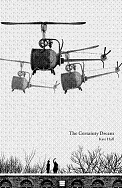
The Certainty Dream
Kate Hall
Coach House Press
$16.95
paper
79pp
978-1552452233
Hall’s spirit guide in the realm of dream is the mynah bird, a brilliant choice as Descartes differentiated human beings from animals on the basis of language. But mynahs can learn to talk, making them a borderline case. Hall’s sympathy is with birds, and some of her most memorable poems are about them. Images of containers – boxes, glass jars, vitrines – also run through the book, the sorts of constraints (and by implication, categories) that the mind imposes on reality; dreams subvert rigid orders.
The tour de force in the collection is “Suspended in the Space of Reason: A Short Thesis,” a poem cast as subversive inquiry into reason. It is delivered in a parody of an academic thesis on whether we see things or only our own minds, and Descartes provides the epigraph, a claim that what he thought was seen with his own eyes was grasped only with the mind. The subversion in Hall’s pseudo-thesis comes from the eruption of contingent facts into the mind of the narrator, such as chipotle-lime mustard, elephants (of course: they’re always in the room), Mars rovers, and game shows. The Mars vehicles are good examples of surprises that ambush reason: they are products of science but have long outlasted their projected period of use; the prediction failed, the mission more than succeeded. Hamlet’s epistemology comes to mind: “There are more things in heaven and earth, Horatio, than are dreamt of in your philosophy.”
It is bracing to read a poet who can engage with the ideas of G. E. Moore, Ronald Searle, Blaise Pascal, and Daniel Dennett. In his third dream on the Vigil of St. Martin, Descartes saw a dictionary and a book of ancient Latin poetry. The dictionary he saw as the “sciences gathered together;” the poetry as uniting philosophy and wisdom. Kate Hall unites philosophy and wisdom – without forgetting the chipotle-lime mustard. mRb






0 Comments